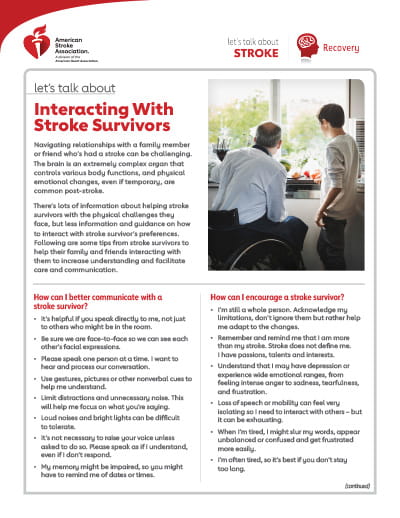Let’s Talk About Interacting With Stroke Survivors
 Navigating relationships with a family member or friend who’s had a stroke can be challenging. The brain is an extremely complex organ that controls various body functions, and physical emotional changes, even if temporary, are common post-stroke.
Navigating relationships with a family member or friend who’s had a stroke can be challenging. The brain is an extremely complex organ that controls various body functions, and physical emotional changes, even if temporary, are common post-stroke.
There’s lots of information about helping stroke survivors with the physical challenges they face, but less information and guidance on how to interact with stroke survivor’s preferences. Following are some tips from stroke survivors to help their family and friends interacting with them to increase understanding and facilitate care and communication.
How can I better communicate with a stroke survivor?
- It’s helpful if you speak directly to me, not just to others who might be in the room.
- Be sure we are face-to-face so we can see each other’s facial expressions.
- Please speak one person at a time. I want to hear and process our conversation.
- Use gestures, pictures or other nonverbal cues to help me understand.
- Limit distractions and unnecessary noise. This will help me focus on what you’re saying.
- Loud noises and bright lights can be difficult to tolerate.
- It’s not necessary to raise your voice unless asked to do so. Please speak as if I understand, even if I don’t respond.
- My memory might be impaired, so you might have to remind me of dates or times.
How can I encourage a stroke survivor?
- I’m still a whole person. Acknowledge my limitations, don’t ignore them but rather help me adapt to the changes.
- Remember and remind me that I am more than my stroke. Stroke does not define me. I have passions, talents and interests.
- Understand that I may have depression or experience wide emotional ranges, from feeling intense anger to sadness, tearfulness, and frustration.
- Loss of speech or mobility can feel very isolating so I need to interact with others – but it can be exhausting.
- When I’m tired, I might slur my words, appear unbalanced or confused and get frustrated more easily.
- I’m often tired, so it’s best if you don’t stay too long.
How can I better assist a stroke survivor in daily tasks?
- I can find it difficult to ask for help. Please offer concrete examples of what you can do (e.g., mow the lawn, pick up groceries, make phone calls, etc.).
- Have patience with me. Everything takes more time, especially activities like bathing and dressing.
- Help keep my home safe. This will prevent falls and injuries that may result from an inability to determine depth and distance.
What else should we know about stroke recovery?
- Recovery has no limit – change is always possible. Don’t expect me to get better on a specific timeline.
- Every stroke is unique. Don’t assume what happened to someone else you know is the same as my experience.
- The effects of my stroke may not always be physical changes that are obvious to you.
How can I learn more?
- Call 1-888-4-STROKE (1-888-478-7653) or visit stroke.org to learn more about stroke or find local support groups.
- Sign up for our monthly Stroke Connection e-news for stroke survivors and caregivers at StrokeConnection.org.
- Connect with others who have also had an experience with stroke by joining our Support Network at stroke.org/SupportNetwork.
Questions for the stroke survivor’s doctor or nurse?
Take a few minutes to write down your questions for the next visit with the survivor’s health care provider. For example:
How can I make my home a safe place for a stroke survivor?
We have many other fact sheets to help you make healthier choices to manage your condition or care for a loved one.
Visit stroke.org/LetsTalkAboutStroke to learn more
Stroke survivor tips contributed by the Marquis Stroke Group, Newberg, Ore. – helping family members and friends better communicate with stroke survivors.
© Copyright 2021 American Heart Association, Inc., a 501(c)(3) not-for-profit. All rights reserved. American Stroke Association is a registered trademark of the AHA. Unauthorized use prohibited. DS17295 4/21